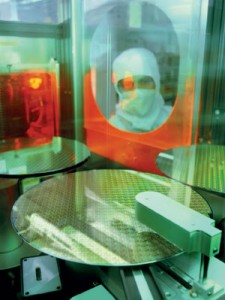
Texas InstrumentsUnit of Texas Instruments, the American enterprise that has won an award for developing technologies with the help of physicistsTexas Instruments
At a time when the small number of qualified human resources threatens to jeopardize the recovery of the economy, the Brazilian Society of Physics (SBF) is working toward correcting one of the problems in the Brazilian labor market: the scant participation of physicists in companies. According to SBF data, Brazil had, in 2007, 8 thousand physics graduates, of which 3 thousand have a doctorate. However, only 2% of these PhDs work for companies. The absolute majority of them work for universities, research centers and fundamental and middle schools, although their scientific knowledge could help companies to face up to the challenges of innovation. For instance, in the United States, every year, the American Physics Society and the American Institute of Physics give awards to physics research that results in the development of new technologies in research centers and company development. In the last few years, these laureates were working for companies such as Texas Instruments, General Electric, IBM Research, Lucent Technologies and Xerox.
Together with the Center for Management and Strategic Studies (CGEE) and with sponsorship of the Finep Studies and Projects Funding Office, SBF has held two workshops in which it brought together researchers and representatives of government and both large and small enterprises, as well of course of pointing out pathways. “Inadequate professional qualification is a bottleneck when it comes to innovating. And it provides an opportunity for physicists, because they have wide-ranging scientific knowledge, are fast learners, are interested in complex problems and work with an overview of the whole,” says Eduardo Couto e Silva, a GCEE physicist and coordinator of the workshops. These are to lead to a final report proposing new strategies. According to SBF chairman Celso Pinto de Melo, the idea is to contribute to the formulation of science and technology policies that foster innovation based on knowledge generated in Brazil and to add value to products made here. “Brazil is on its way to becoming the world’s fifth largest economy. Our challenge is to understand how physics can contribute to this and what to do for Brazilian science, and for physics in particular, to achieve an equivalent ranking,” he states.
The workshops, held in 2011 and last February, have already yielded a picture of corporate perception regarding physicists (and vice-versa). This should be useful in order to bring together these two groups. The representatives from companies said that based on the experience they have had with physicists they appreciate the latter’s curiosity and disquietude, as well as their use of their wide-ranging scientific knowledge to solve problems. They also praised the ability of the physicists to learn new techniques. However, they reported difficulty working with physicists. The main issue concerns the latter’s lack of training to work within a corporate environment. “There was a recurrent complaint that the education of physicists in Brazil is essentially geared toward a scientific career, causing them to be frequently regarded as dispersive and inexperienced when it comes to projects,” says Couto e Silva.
One preliminary conclusion of the workshops is that the community of Brazilian physicists sees their particular areas only as links with industry and are unable to grasp the requirements of the world of production and technological development. Another complaint voiced by the firms is that the best physicists in the country continue to prefer a career in public research centers, so that they are normally not available for the private sector. “Industry wants the most qualified physicists too,” said, in one of the workshops, Jarbas Caiado de Castro, from Opto Eletrônica, an enterprise founded in 1985 by researchers from the Physics Institute of the University of São Paulo (USP), in São Carlos. The firm has developed, among other projects, a camera for Cbers-3, the third generation of the Chinese-Brazilian Land Resources Satellite, to be launched this year probably (see Pesquisa FAPESP issue 162).
The physicists, in turn, are interested in expanding their presence in corporations, but remain cautious. They think it is important for some changes to be made in the curriculum of the physics courses, encouraging interdisciplinary work in strategic areas and strengthening areas with more potential for innovation. However, they are resistant to the notion of creating a course that is heavily geared toward corporate needs. “They are afraid of educating professionals that might lack a solid basis, without the wide-ranging education of a physicist,” says Couto e Silva. The researchers also want companies to invest more heavily in research and development. This would increase demand for physicists, as in Brazil, at present, there is a lack of projects that depend on knowledge of physics or on the work of physicists. They also complain that professional regulations are lacking, which causes physicists to be hired for technical jobs with wages and responsibility levels lower than those of engineers. For Couto e Silva, there is room for improvement, even if the changes do not materialize quickly.
According to the SBF chairman, the area in which scientists and companies come together, most notoriously, is to exploit oil. However, there is potential for participation in fields such as information technology, development of pharmaceutical products, biotechnology, nuclear energy and in the aerospace industry. “The industrial base of the defense sector needs more physicists,” says Vice-admiral Carlos Afonso Pierantoni Gambôa, executive vice-president of the Association of the Security and Defense Materials Industries (Abimde), in reference to the challenges of restructuring the Brazilian defense industry. “Knowing physics is essential for innovative projects in our companies. Take the example of the engineers that graduate from ITA, the Technological Institute of Aeronautics. Most of them work for Embraer or are absorbed by good opportunities in the financial markets. For the smaller companies in the sector, there is a shortage of qualified labor,” he states.
Republish